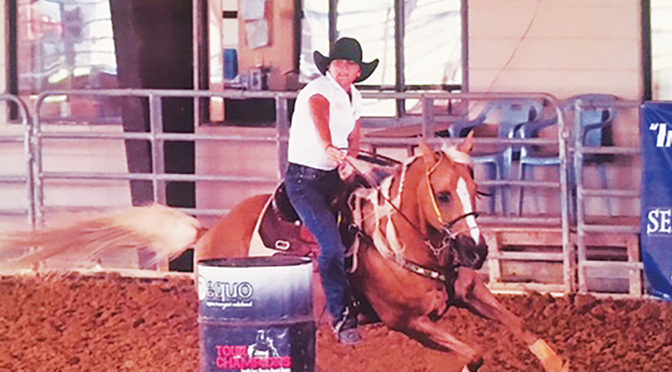A Lifelong Love Of Horses Inspires Barrel Racer Courtney Kitching
Courtney Kitching of Wellington has been riding since she was five years old. She began barrel racing at eight years old and has never looked back.
“My mom had horses and a whole farm when she was younger but moved away,” said Kitching, now 21 years old. “Then, after I came along, my family got some property and one horse.”
It has grown from there. Today, Kitching is training seven horses, including one breed mare. Her favorite, however, is Nemo.
“He just has a lot of personality. I got him off the Quarterhorse racetrack and began training him,” she recalled. “It has been a long process, but he’s very talented. I stuck with him, and now he is actually my fastest horse.”
Her horses each have their own personalities.
“Each horse is different,” Kitching explained. “Some are hot in the alleyway; some have to be warmed up a certain way. With some, you have to be quieter on the ground because they get spooked easy.”
Kitching spends time getting to know each horse. It’s almost unavoidable with the hours she puts into riding and practicing.
“I have a lot to ride,” she said. “So, I go out three or four times a week, riding multiple horses. I suppose it adds up to 30 hours or more each week.”
Kitching is a member of the South East Florida Barrel Racers organization, although she started with the smaller shows through the Palm Beach County Mounted Posse.
“I tried other disciplines as well — jumping, English,” she said. “But I found I had a love for barrel racing.”
In the 1930s, barrel racing was established as a women’s rodeo event, where female riders alternated maneuvering between a figure 8 and a cloverleaf pattern. Judging was based on the rider’s ability to work through the patterns — and on her outfit.
All that changed in 1949 when the newly established Girls Rodeo Association, now the Women’s Professional Rodeo Association, made the event all about speed. Suddenly, the relationship between horse and rider became crucial.
The course consists of barrels placed in a triangle in the middle of an arena. The rider races into the arena at top speed, and the timer starts when the team crosses the start line. After completing the tight turns of a cloverleaf pattern and racing across the finish line, the timer stops. The team that puts up the best time with no overturned barrels wins. What the rider is wearing is no longer a factor — it’s all about the athleticism and abilities of the horse and rider pair.
Modern barrel racing is open to girls, boys, men and women of all ages and levels of experience — weekend riders as well as professionals. Payouts and award packages sometimes surpass $250,000.
The win of which Kitching is currently most proud took place last fall in Kissimmee. “It was a Halloween Spooktacular. Nemo won the barrel race out of about 160 horses,” Kitching said. “We actually outran two NFR [National Finals Rodeo] finalists.”
The South East Florida Barrel Racers put on the events in which Kitching generally competes. However, there’s also the National Barrel Horse Association, which stages events throughout the U.S. and hosts its annual World Championships in Perry, Ga.
“You have to qualify to go to that,” Kitching said. “There are also rodeos. I haven’t really started at the big rodeos. I’m still in school to become a veterinarian.”
Kitching is attending classes at Florida Atlantic University with an eye toward the University of Florida, which houses the only veterinary college in the state. “My passion is horses. I love everything about them,” Kitching said. “They’re very innocent but have the capacity to do so many different things. Take dressage, for instance. It’s beautiful. I have a love to care for horses. If they’re hurt or injured, I have a passion to help them.”
And what would Kitching tell today’s eight-year-old wanting to barrel race?
“Never give up,” she said. “I definitely had to work my way up. I wasn’t given a top barrel racing horse; I made my own. The horses taught me how to ride; how to barrel race properly. Once you get riding better, and you train a horse that has the potential to win, you start winning. It’s just like in anything — when you start, you’re not going to be the best. You have to work for it. It takes skill and dedication. You’ll improve each week and find that what you get out of a horse is really amazing. My goal in life is not to make it to the NFR or to make it really big, but just to be happy with what I’m doing — and to make a difference.”
